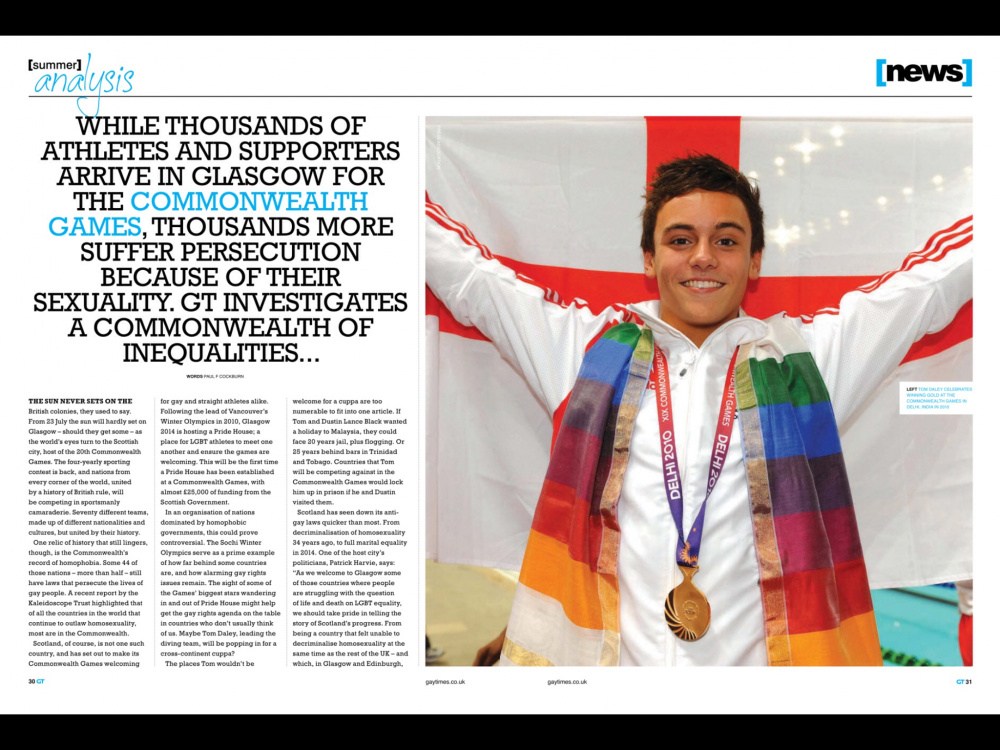
The thousands of athletes, support staff and sports fans who travel to Glasgow this summer for the 20th Commonwealth Games—aka Glasgow 2014—will find something potentially controversial in the heart of the city’s fashionable Merchant City district: a Pride House.
Pride Houses have been a feature of notable international sporting events since the Vancouver Winter Olympics in 2010—the notable exception, of course, being this year’s Winter Olympics in Sochi, Russia. This will be the first time a Pride House has been established at a Commonwealth Games, potentially controversial, given its official backing by—and nearly £25,000 funding from—the Scottish Government.
Speaking earlier this year, the Scottish Green MSP for Glasgow, Patrick Harvie, said: “As we welcome to Glasgow some of those countries where people are struggling with the question of life and death on LGBT equality, we should take pride in telling the story of Scotland’s (own) progress from being a country that felt unable to decriminalise homosexuality at the same time as the rest of the UK—and which, in Glasgow and Edinburgh, people felt that it was not yet safe to have a Pride march—to being this country which is proud to pass equal marriage legislation for this generation and for the future.”
Yet, as a recent report by the Kaleidoscope Trust pointed out, more than half of the countries round the world which criminalise homosexuality are members of the Commonwealth. Depending on who you ask, between 41 and 44 Commonwealth member states are places where LGBT issues are not about so much about marriage and pensions, but personal safety and violence.
When the Pride House was announced, the Games’ Chief Executive David Grevemberg welcomed the news. “Like the city and nation, Glasgow 2014 aspires to be inclusive and welcoming. We have the Commonwealth Games Federation’s values of Equality, Humanity and Destiny at the heart of our delivery of the Games for the athletes of the Commonwealth. Like the city and nation, Glasgow 2014 aspires to be inclusive and welcoming.”
More recently he told GT: ““I think Glasgow 2014’s an opportunity to show a society that includes everyone, that values everyone, and to have open dialogue and to encourage courageous actions. I think there’s a lot to be gained from a strong sense of dialogue and conversation. I hope Glasgow 2014 creates that bold conversation about who we are in the Commonwealth, in all our diversity, and where we want to go. In the past the Commonwealth Games have been referred to as ‘the Friendly Games’; with modern media now, we can be more connected. We want people talking; that’s how we evolve, how we move forward.”
Led by LEAP Sports Scotland—a charity which works for greater inclusion for LGBT people in sport, and against homophobia within sporting contexts—the Pride House will open its doors to welcome lesbian, gay, bisexual and transgender athletes, fans and visitors during the Games.
For some, of course, simply saying hello is not enough. Dr Purna Sen, Deputy Director of the Institute of Public Affairs at the London School of Economics, wrote in the Huffington Post: “Lesbians, gay men and trans people are citizens of Brunei and Uganda too. Their own governments should defend them but when that doesn’t happen it’s important for them to know they have friends in the international community. They can only know when we say so loud and clear. The Commonwealth should be ashamed of its failure to uphold its own values. And Britain should not leave itself open to suspicions that trading and financial interests come ahead of human rights every time.”
Yet, as Scott Cuthbertson, Community Development Officer with Scottish charity the Equality Network, points out, there’s one significant complication. “The majority of LGBT legislation in Commonwealth countries came from British colonial rule,” he says. “Section 377 of the Indian Penal Code, for example, came from British rule in 1861.”
Leaders of many Commonwealth member states are all too keen to shout out when they’re being lectured—particularly on what might be considered ethical issues—by either the British Government or UK-based organisations. For this reason, Scott believes that there needs to be a two-way relationship with such Commonwealth countries.
“People don’t want the former colonial power coming in telling them what to do,” Scott says. “If we push the issue too hard, then we may actually make it worse for LGBT people in those countries, so we’ve got to make sure that we take the right approach, that we support the voices of LGBT people in those countries and listen to what they’re saying about what they want to happen—rather than us deciding what is best for them.”
In that vein, the Equality Network is organising an exhibition at the Pride House which will run for the duration of the Games. “We’ve contacted 400 LGBT organisations around the Commonwealth, to provide content and information for the exhibition,” Scott explains. “We really want to hear their voices. We want people to recognise that we’re all in the Commonwealth family together.”
LGBT people’s voices from across the Commonwealth will also be heard through an entertaining and awareness-raising dance theatre performance presented as part of the Games Cultural programme. 44 stories—written, directed and designed by Glasgow-based Drew Taylor, promises to be “an athletic, poetic exploration of visibility, activism, and the right to wake up next to the person you love”, a “celebration of life lost and dreams of a brighter future for life now” that will stylistically draw on “90s New York Ballroom culture, queer hip-hop dance styles, poetry slams and cabaret”.
“We hope that the Games will provide a first step to wider engagement with Human Rights in the Commonwealth,” Scott says, “so that we pass the torch on to the next Commonwealth Heads of Government meeting and then the 2018 Commonwealth Games in Queensland, Australia.”
www.glasgow2014.com
www.equality-network.org
www.kaleidoscopetrust.com
www.drewmakestheatre.com/44-stories
A somewhat edited and rewritten version of this article was published in the Summer 2014 issue (#435) of Gay Times.